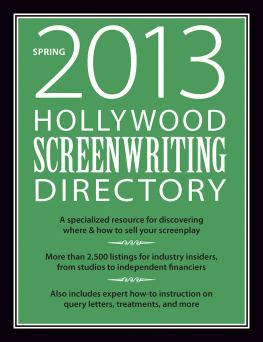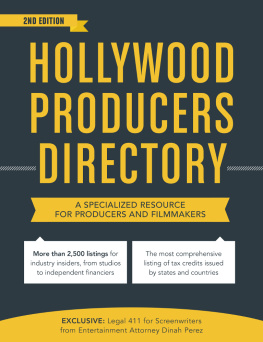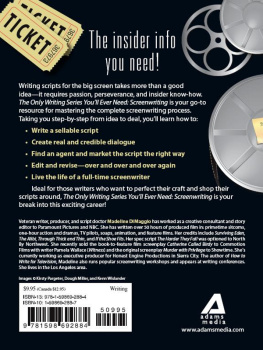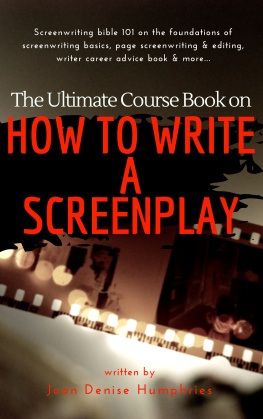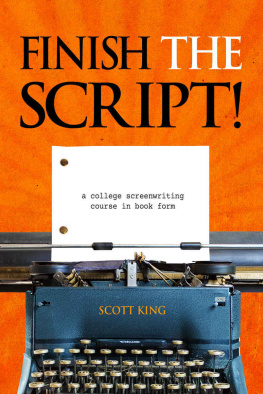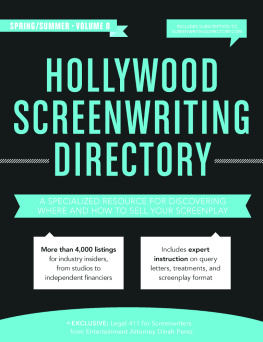Copyright 2013 by F+W Media, Inc.
All rights reserved.
No part of this publication may be reproduced in any form or by any electronic or mechanical means including information storage and retrieval systems without written permission from the publisher.
Printed and bound in the United States of America.
Published by F+W Media, Inc.
3510 West Magnolia Boulevard
Burbank, California 91505
www.fwmedia.com
How to Use the Hollywood Screenwriting Directory
Dear Fellow Screenwriter,
It's no secret that things in Hollywood move at a supersonic pace. New production companies are formed and execs move up the ladder or switch to new studios. And that's exactly why we put in overtime to produce this extensive spring 2013 edition of the Hollywood Screenwriting Directory, which brings you the most current contact information on more than 2,500 Industry insiders (up from the previous 1,500), along with updates on more than 40% of our listings.
What you hold in your hands is a very specialized directory created by The Writers Store based on our extensive experience serving the screenwriting community since 1982. It contains a range of people to contact regarding your script, from ambitious upstarts to established studio execs, along with management companies who package production deals and independent financiers/distributors with a production wing. For each listing, you'll find the kind of useable information you need: street and email addresses, whether or not they accept unsolicited material, and how they prefer to receive submissions.
While having access to this data is crucial, just as essential is an understanding of the right way to use it. These insiders are flooded with submissions daily. Any indication of incorrect format or other amateur flubs in the first few pages will quickly send your script to the trash.
We can't emphasize enough how important it is that your submission is polished and professional before you send it out for consideration. Screenwriting software makes producing an Industry-standard screenplay simple and straightforward. Programs like Final Draft and Movie Magic Screenwriter put your words into proper format as you type, letting you focus on a well-told story rather than the chore of margins and spacing. In these pages, we've also included a guide to proper screenplay format, along with sample title and first pages to help you send out a professional script.
Besides a properly packaged submission, it's also wise to know your audience before you send out any materials. If your script is an action thriller with a strong female lead, don't send it to Philip Seymour Hoffman's production company. Actors establish their own companies so that they're not reliant on studios for roles. Pad an actor's vanity (and his pipeline) by submitting materials catered specifically to him.
You may find that a good number of companies do not want unsolicited submissions. It's not that they're not open to new ideas; they're not open to liability. A script is property, and with it, come ramifications if not handled properly. If you choose to disregard "no unsolicited submissions," sending your script with a submission release form gives it a better chance of getting read. Consult with an entertainment attorney to draft an appropriate form, or consult a guide like Clearance and Copyright by Michael C. Donaldson, which has submission release form templates. It's also prudent to protect your work. We recommend registering your script with the WGA (Writers Guild of America, West) or the ProtectRite registration service.
A benefit of the digital age is that the same companies that are not open to receiving unsolicited submissions will gladly accept a query letter by email. Take advantage of this opportunity. Craft a well-written and dynamic query letter email that sells you and your script. We have included a sample query, and some tips and guidelines on how to write great query letters.
While Hollywood is a creative town it is, above all, professional. Do a service to yourself and the potential buyer by being courteous. If you choose to follow up by phone, don't be demanding and frustrated. These people are overworked and do not owe you anything. It's okay to follow up, but be sure to do so with respect. And if you pique a buyer's interest and she asks for a treatment, you must be ready to send off this vital selling tool at once! That's why we've also included a handy guide to writing treatments in this volume.
While it may oftentimes feel like the opposite, The Entertainment Industry is looking for new writers and fresh material. BUT (and this is important) they're also looking for those aspiring scribes to take the time to workshop their scripts with an experienced professional and get them to a marketable level. The Writers Store can help you get ready for the big leagues through our slate of screenwriting courses, personalized coaching and Development Notes service, which works in a format that mirrors the same process occurring in the studio ranks.
Hollywood is the pinnacle of competition and ambition. But that's not to say that dreams can't happenthey can, and they do. By keeping to these professional guidelines and working on your craft daily, you can find the kind of screenwriting success you seek.
Wishing you the best of luck,
Jesse Douma
Editor
What is a Screenplay?
In the most basic terms, a screenplay is a 90-120 page document written in Courier 12pt font on 8 " x 11" bright white three-hole punched paper. Wondering why Courier font is used? It's a timing issue. One formatted script page in Courier font equals roughly one minute of screen time. That's why the average page count of a screenplay should come in between 90 and 120 pages. Comedies tend to be on the shorter side (90 pages, or 1 hours) while Dramas run longer (120 pages, or 2 hours).
A screenplay can be an original piece, or based on a true story or previously written piece, like a novel, stage play or newspaper article. At its heart, a screenplay is a blueprint for the film it will one day become. Professionals on the set including the producer, director, set designer and actors all translate the screenwriter's vision using their individual talents. Since the creation of a film is ultimately a collaborative art, the screenwriter must be aware of each person's role and as such, the script should reflect the writer's knowledge.
For example, it's crucial to remember that film is primarily a visual medium. As a screenwriter, you must show what's happening in a story, rather than tell. A 2-page inner monologue may work well for a novel, but is the kiss of death in a script. The very nature of screenwriting is based on how to show a story on a screen, and pivotal moments can be conveyed through something as simple as a look on an actor's face. Let's take a look at what a screenplay's structure looks like.

